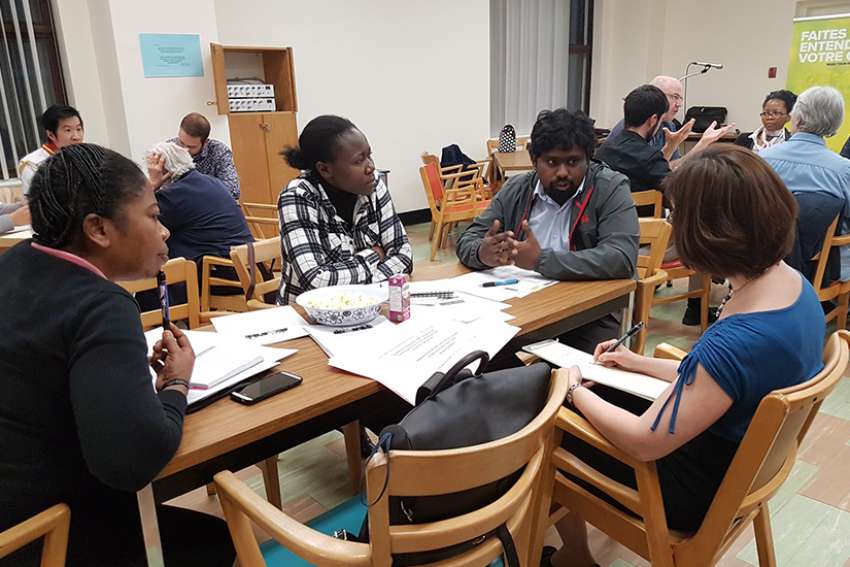Youth and adults gather in Montreal to discuss the needs of young people in preparation of the 2018 Synod on Youth. "it is important that we realize that our duty is to inform and not to convince. Conviction is the work of the Holy Spirit and ours is to plant the seeds. People must exercise their wills in choosing God," Elizabeth writes.
Photo from Register files/Courtesy of Isabel Correa
Speaking Out: Debate without the name-calling
By Elizabeth Iwunwa, Speaking Out
A few days ago, I found myself speaking at work about my beliefs regarding artificial contraceptives.
My friend, who regards herself as a Catholic feminist, had penned a piece that was published in the student newspaper. She spoke in detail about how the very contraceptives that promised liberation to women had only succeeded in betraying them.
I had not planned on veering into this topic with my co-worker and would not do justice if I attempted to recount the conversation. Yet, I find it remarkable that our time together was respectful, especially because while we identified a common problem, we proffered solutions that were ideologically at odds with each other.
My co-worker’s position reflected that of many young women today. She believes that a sexual act does not intrinsically have meaning and commitment need not be a prerequisite for the act. On the matter of contraceptives, she said that for women with irregular cycles, artificial ones were the most effective in preventing unplanned pregnancies.
I, on the other hand, am opposed to artificial contraceptives because of the side effects that are seldom mentioned by its advocates. In addition to Church teaching, I also think contraceptives absolve the other party (typically male) from long-term responsibilities that results from a sexual act.
It is worth noting that our conversation did not descend into the pit of name-calling and the accusations of sinister motives that often accompany such issues.
There is very little left to say on the matter of tension in our world, especially with regards to conflicting beliefs. What I can share are a few suggestions that may aid those who enjoy dialogue with those with whom they disagree.
First, it is important that we realize that our duty is to inform and not to convince. Conviction is the work of the Holy Spirit and ours is to plant the seeds. People must exercise their wills in choosing God.
Respect is reciprocal. The same fervour with which we desire respect for our beliefs we must likewise treat the beliefs of others. Respect does not mean shrinking back or watering down the truth. There is something to be said for respectful disagreement.
Furthermore, a person is not simply a sum of their ideas. To reduce a full human being to an embodiment of a certain ideology is a slap in the face of their complexity and uniqueness. Separate a sin from a sinner and address the sin.
The outcome of these conversations, we cannot guarantee. Yet, those with whom we speak remain willed and loved by God. The living of the truths we hold dear speaks louder than our words ever could.
(Iwunwa, 20, is a fourth-year psychology student at University of Prince Edward Island in Charlottetown, PEI.)
Please support The Catholic Register
Unlike many media companies, The Catholic Register has never charged readers for access to the news and information on our website. We want to keep our award-winning journalism as widely available as possible. But we need your help.
For more than 125 years, The Register has been a trusted source of faith-based journalism. By making even a small donation you help ensure our future as an important voice in the Catholic Church. If you support the mission of Catholic journalism, please donate today. Thank you.
DONATE

